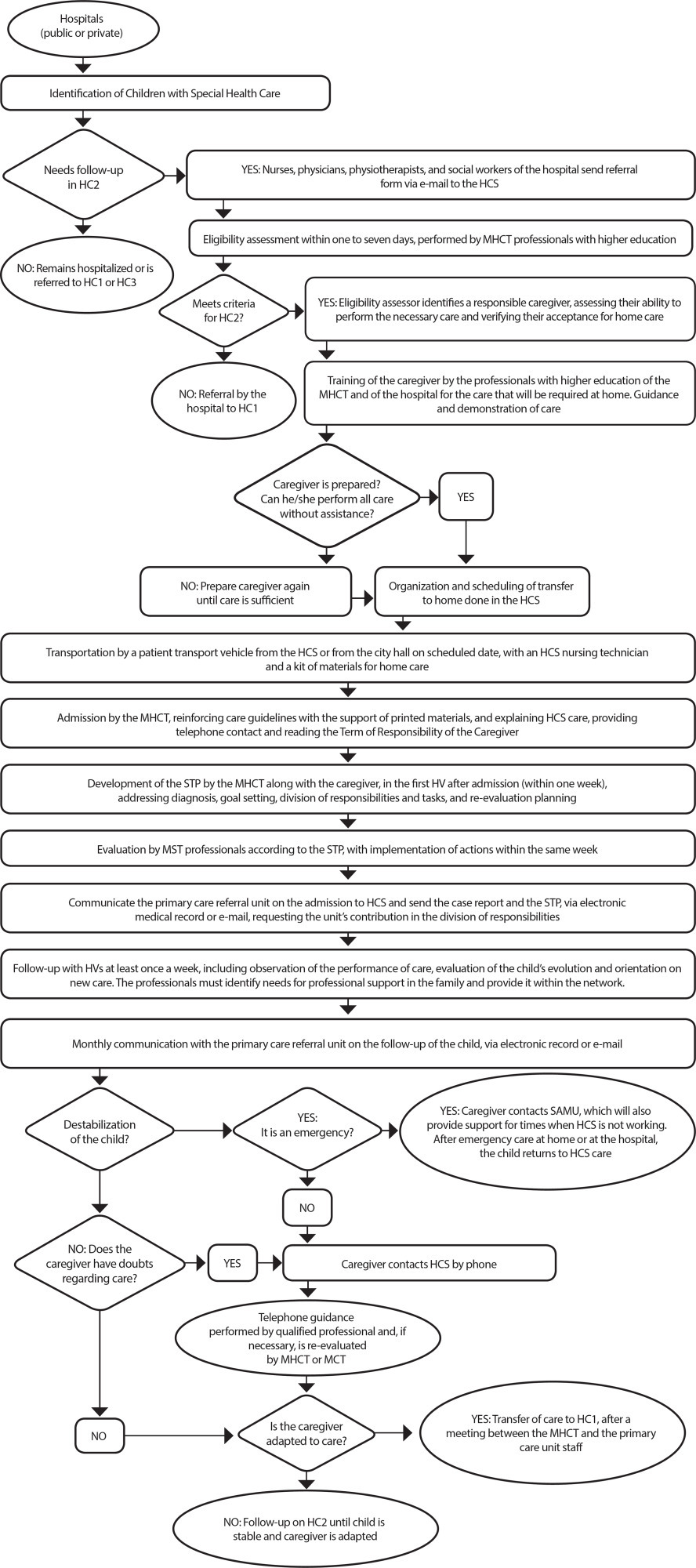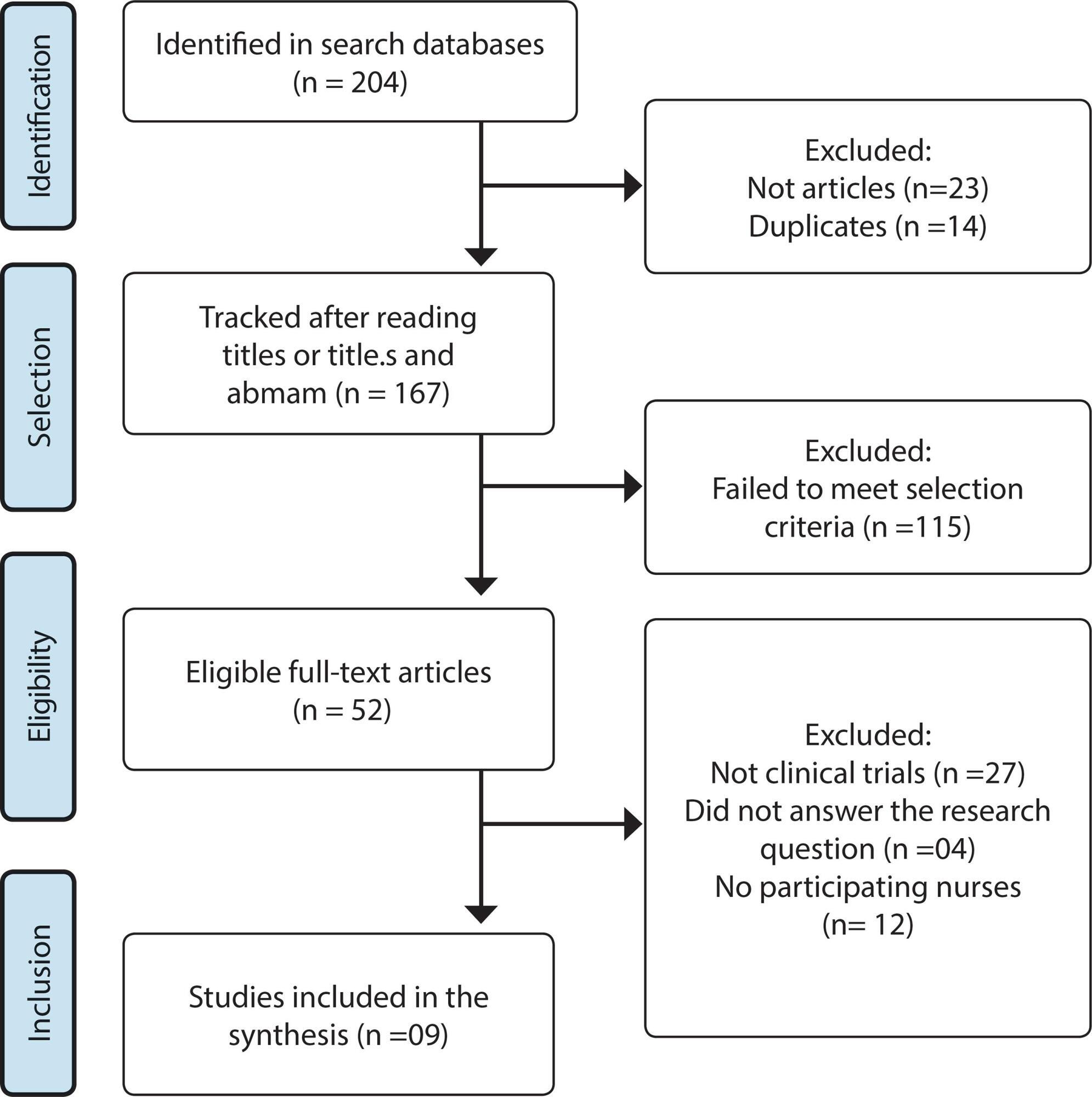-
ORIGINAL ARTICLE
Validation of nursing diagnosis for nursing consultation on home visit to adults
Revista Brasileira de Enfermagem. 2021;74(2):e20200115
05-03-2021
Resumo
ORIGINAL ARTICLEValidation of nursing diagnosis for nursing consultation on home visit to adults
Revista Brasileira de Enfermagem. 2021;74(2):e20200115
05-03-2021DOI 10.1590/0034-7167-2020-0115
Visualizações0ABSTRACT
Objectives:
to identify and confirm the priority nursing diagnosis of International Classification for Nursing Practice® for home nursing consultation to adults in Primary Health Care.
Methods:
qualitative study, of methodological and validation type. The 5-point Likert scale was used, with a minimum Content Validity Index of 80% consensus among judges., considering the answers “priority” or “very priority” for the list of nursing diagnoses presented. 23 expert judges participated in this survey.
Results:
a hundred and eleven nursing diagnoses of prepared statements lists have been grouped by human systems and sociodemographic characteristics. were grouped by human systems and sociodemographic characteristics. Eighty-three of them (74.77%) had a Content Validity Index equal or higher to 0.8; and 27 (32.5%) had an index of 1.0 (100%) among judges.
Conclusions:
nursing diagnosis validated can be used to assist clients in home nursing consultations in Primary Health Care.
Palavras-chave: Homebound PersonsHouse CallsNursing DiagnosisStandardized Nursing TerminologyValidation StudyVer mais -
ORIGINAL ARTICLE
Organizational flow chart of home care for children with special health care needs
Revista Brasileira de Enfermagem. 2020;73(suppl 4):e20190310
09-21-2020
Resumo
ORIGINAL ARTICLEOrganizational flow chart of home care for children with special health care needs
Revista Brasileira de Enfermagem. 2020;73(suppl 4):e20190310
09-21-2020DOI 10.1590/0034-7167-2019-0310
Visualizações0Ver maisABSTRACT
Objective:
To develop a workflow protocol for Home Care (HC) services in the HC2 modality for children with special health care needs (CSHCN) in the state of Parana.
Method:
Quantitative, descriptive, exploratory, multiple case studies. Data was collected with professionals from the eight home care services in Parana. Data were analyzed using the Strengths, Weaknesses, Opportunities and Threats (SWOT) methodology, from which a 5W2H method of action plan was developed, resulting in a flow chart.
Results:
Considering the strategies found in Home Care services, such as planned hospital discharge, caregiver training, organized transportation and singular therapeutic project, a flow organization protocol for children with special health care needs in Home Care services was developed.
Conclusion:
The protocol developed makes it possible to organize the care provided to children with special health care needs in home care.

-
REFLECTIVE
Recommendations in covid-19 times: a view for home care
Revista Brasileira de Enfermagem. 2020;73(Suppl 2):e20200310
06-29-2020
Resumo
REFLECTIVERecommendations in covid-19 times: a view for home care
Revista Brasileira de Enfermagem. 2020;73(Suppl 2):e20200310
06-29-2020DOI 10.1590/0034-7167-2020-0310
Visualizações0ABSTRACT
Objective:
To suggest recommendations for the practice of Home Nursing in the context of COVID-19.
Method:
Reflective study, originated from readings associated with the theme, available in current guidelines from the Pan American Health Organization, World Health Organization and the Ministry of Health.
Results:
Recommendations were developed from current scientific evidence for prevention of infections, control of epidemics and pandemics in the Brazilian home scenario.
Final considerations:
the reflections achieved contribute to guiding actions for better assistance to the patient, family caregivers and the community in the perspective of safe home care with COVID-19, and it is characterized as an introductory discussion on the theme, encouraging new studies to be carried out from the unfolding of the current scenario.
Palavras-chave: Delivery of Health CareHome Care ServicesHome Health NursingHomebound PersonsSARS VirusVer mais -
REVISÃO
Nurses’ competencies in health promotion for homebound older people
Revista Brasileira de Enfermagem. 2019;72(suppl 2):311-318
12-05-2019
Resumo
REVISÃONurses’ competencies in health promotion for homebound older people
Revista Brasileira de Enfermagem. 2019;72(suppl 2):311-318
12-05-2019DOI 10.1590/0034-7167-2018-0446
Visualizações0Ver maisABSTRACT
Objective:
to identify competencies related to health promotion targeting homebound older people, as they appear in the literature.
Method:
systematic review using the LILACS, Scopus, CINAHL, PubMed and Cochrane Library databases. The search was performed in November 2017. Selected articles were analyzed according to nine competency domains: enable change; advocate for health; mediate through partnership; communication; leadership; assessment; planning; implementation, and evaluation and research.
Results:
nine clinical trials were included. All health promotion competency domains were identified in the reviewed research interventions, performed with homebound older people.
Conclusion:
studies showed that the employed treatments were beneficial for the homebound older population. Interventions based on health promotion competencies were positively identified, and are linked to an effective and high-quality health care practice.




